At $999, the KestrelMet 6000 is not for the casual weather enthusiast. Despite this, its excellent features, such as top-tier accuracy, ease of installation, and high-quality construction, make it a worthwhile investment for hardcore weather fans.
It matches the Davis Vantage Pro2 in size and accuracy, offering even better tools to view and analyze data. However, unlike the Pro2, it doesn’t require additional hardware for internet connectivity and outperforms Davis’ Vantage Vue in terms of temperature accuracy. Even compared to the WeatherFlow Tempest, KestrelMet 6000 proves superior in all aspects except for lightning detection and UV/solar sensors, the latter of which kept this from a nearly perfect score.
Standard are indoor and outdoor temperature and humidity measurements, rainfall, wind speed and direction, and barometric pressure. Solar irradiance sensors are available as an option at the time of purchase, as well as soil moisture and leaf wetness sensors. While the hefty price tag may be daunting, for those who value accuracy and the capacity for expansion, the KestrelMet 6000 is a solid choice.
Kestrel makes incredible weather meters, but can it also make a great home weather station? We have our answer, and it’s the KestrelMet 6000. The station comes in two flavors: a cellular model for $1,299 and a Wi-Fi model for $999. While the pricing isn’t much different from the Vantage Pro2, the cellular version is $1,000 cheaper.
The KestrelMet 6000 is different from anything Kestrel has released before. Unlike its weather meters, it is meant for fixed use. It’s also a large station, roughly the same size as the fully assembled Davis Vantage Pro2. We tested the Wi-Fi version, but I’d opt for cellular for remote use or where Wi-Fi connectivity might be poor.
KestrelMet 6000 Standard Features and Options
The 6000 measures all the basics: temperature, humidity, wind speed and direction, barometric pressure, and rainfall. A leaf wetness sensor ($149), a solar irradiance sensor ($199), and a soil sensor kit ($599) are also available, but most will find the standard sensors more than sufficient. You’ll also want to choose a mount: Kestrel offers a tripod ($99) or mono mount ($69) built specifically for the KestrelMet 6000.
“Prosumer” weather stations don’t have much competition because they don’t sell in as large numbers as cheaper weather stations. Comparable weather stations here would be solely from Davis: the Davis Vantage Pro2 or Pro2 Plus. However, either model needs additional hardware to connect your station to the Internet.
Unlike the 6000, the Vantage Pro2 requires a bit more installation. You also gain fan aspiration (only the Pro2 Plus offers this). In our experience, the 6000 is as accurate as a Davis station, with better tools to view and analyze your data.
As long-term owners of a Davis Vantage Vue weather station, we were especially interested in finding out how the 6000 performed against the Vantage Vue. While the Vantage Vue generally did well in providing accurate readings, we noticed a difference in temperature readings on sunny days. The Vantage Vue would report about 1-2° too high in these situations.
Still, with the new WeatherLink Console, the Vantage Vue might still be an option for those who don’t have $1,000 to spend on a weather station.
The 6000 and the Tempest are smart home-ready weather stations with IFTTT support. However, the KestrelMet is superior to the Tempest in almost every aspect. The only things the KestrelMet 6000 doesn’t have are lightning detection (which we think is one of the Tempest’s standout features) and solar and UV sensors.
Readings on the 6000 are also much more accurate overall, especially in terms of rainfall. While the haptic rain gauge is innovative, it isn’t as precise as the traditional tipping cup rain gauges in most home weather stations.
Installation
Kestrel ships the KestrelMet 6000 almost entirely preassembled, requiring minimal work. In the instruction folder, you’ll find extra screws, a screwdriver, and an Allen wrench. Attaching the anemometer was the most work I had to do, besides securing the mast to the mount. As a result, you’ll probably spend about 20 minutes on this part of the process. The instructions were also clear and easy to follow.
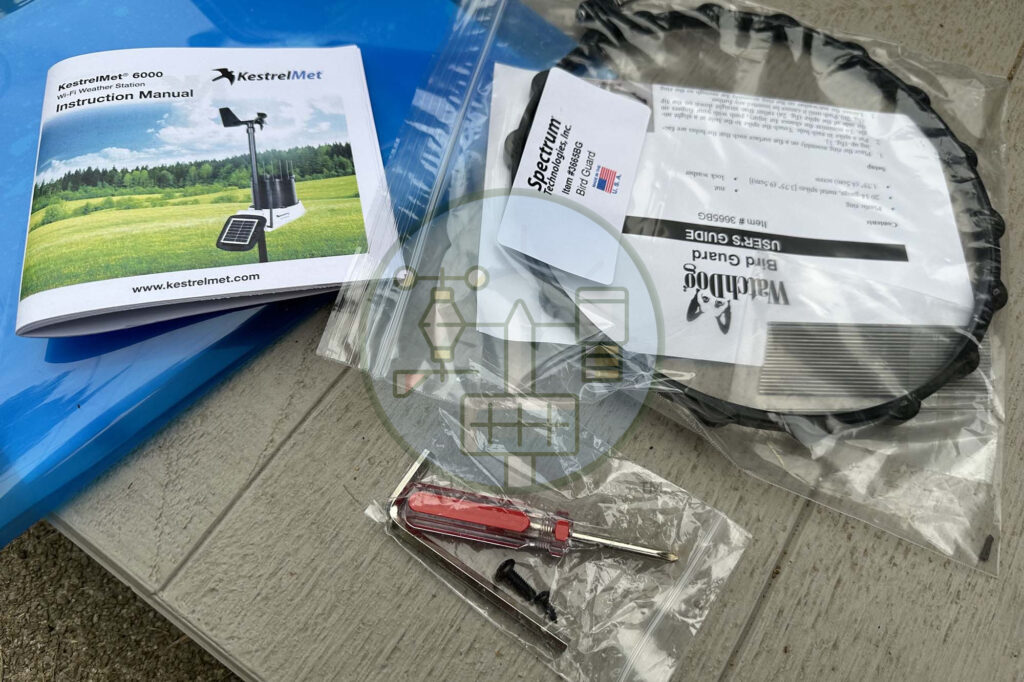
Kestrel took time to ensure the installation process was smooth. I had fewer issues setting this up than some Ambient Weather stations I’ve tested. Most of my installation time was spent getting the sensor suite level (necessary for rain gauge accuracy). You’ll want to have a level close by that is at least as long as the diameter of the rain gauge bucket. While your phone will work in a pinch, a level will make this much more manageable.
Be sure to flip the power switch on the bottom of the sensor suite after setting up the sensor on your Wi-Fi network. This will prevent false readings from being measured while you install your station on the mount. Remember to switch it back on after you’re done with the installation.
Nielsen-Kellerman owns both Ambient Weather and Kestrel. Rather than creating an entirely new platform, the 6000 connects to the Ambient Weather Network. Since a console isn’t included, you can view data using the AWN app or website.
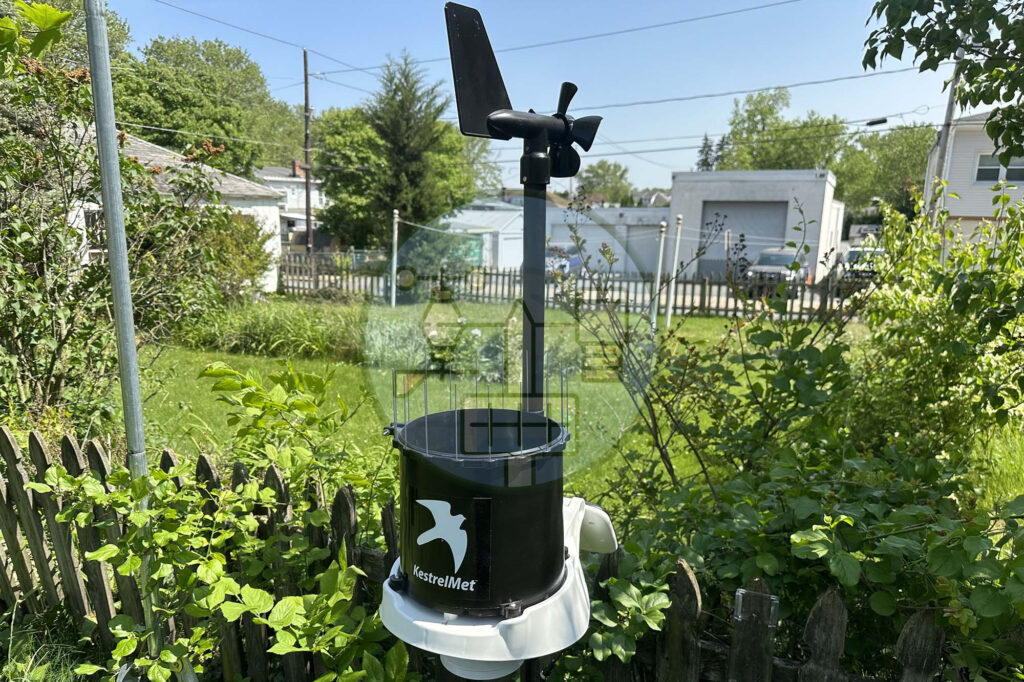
Our Experience
We hate to return to the price, but it is a significant factor. Very few weather stations are this expensive, so the KestrelMet 6000 was given a closer look than other stations we’ve tested. And it met our expectations.
A few things are going for the 6000, which make it so good:
- The 24-hour aspirating fan continues to read accurately in direct sunlight and is a standard feature.
- Bird spikes keep your feathered friends from relieving themselves in your rain gauge.
- Sensor accuracy across the board is top-tier.
- It’s easy to add additional sensors, which are automatically detected.
- Strong Wi-Fi. We have the station 200 feet away from our closest access point without any issues.
- The Ambient Weather Network app is well laid out and easy to use.
I did have some issues with the barometer, though. During setup, the station searches for the closest official weather station and then adjusts it based on the elevation difference. That didn’t seem to work, as my readings were still off. However, this might be a glitch on AWN’s end: I’m currently investigating this with Kestrel support (the barometer is factory-calibrated, so no adjustment is available).
Update—7/17/23: Kestrel apparently fixed this issue in early July, which was caused by a software bug. Barometric pressure readings are now correct.
The 6000s’ omission of solar/UV data is odd. These sensors are included in even the cheapest Ambient Weather stations and the WeatherFlow Tempest. There’s also no lightning sensor (at least at the moment). Otherwise, the station is almost perfect.
Update: Not long after our original review, Kestrel added this as an option at purchase.
Others have not been so smooth.
In the two years since our review was posted, we’ve seen some reports of reliability issues, including early failure of some sensors. It does not appear to be a widespread issue, but it was factored into our decision to recommend the Davis Vantage Pro2 Plus instead if you don’t need the cellular connectivity.
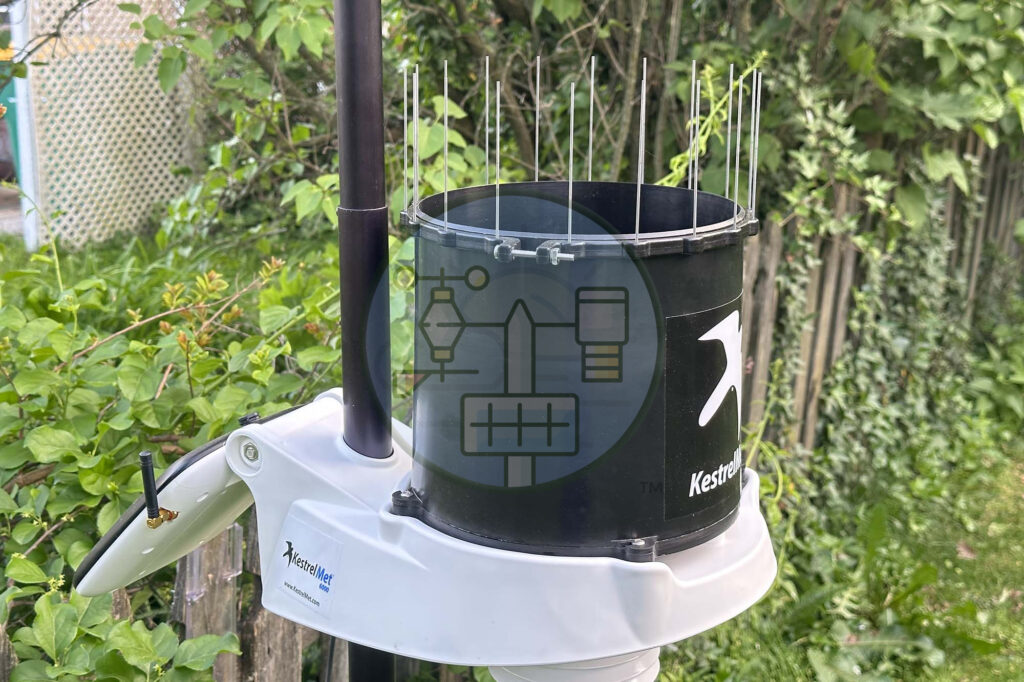
Accuracy
Quick note: Our test station was mounted at eye level so that we couldn’t get an accurate test of the anemometer.
Kestrel’s handheld weather meters are highly accurate, and Kestrel did not disappoint here. The fan aspiration helped with the accuracy of the thermometer and hygrometer. During much of the test period, it was scorched, which meant many cloud-free days with direct sunlight. A home weather station can err on the warm side without fan aspiration.
The anemometer is highly sensitive, even more so than the Davis Vantage Vue. It could be age, too (Davis recommends replacing the anemometer assembly every few years), but in lighter winds, the 6000 seemed to work better. It uses a propeller system rather than the standard cup and vane, which might explain some differences.
While we plan to update our rain gauge tests once Mother Nature cooperates, we compared readings from the Davis Vantage Vue and the 6000 with our Stratus Precision Rain Gauge readings, an analog rain gauge built to NWS specifications. The chart below will list these results.
| Stratus Rain Gauge | Davis Vantage Vue | KestrelMet 6000 | |
| Listed Accuracy | – | +/- 5% | +/- 5% |
| Actual Reading | 0.07” | 0.07″ | 0.07″ (+0%) |
The KestrelMet 6000 and Davis Vantage Vue were as accurate as the Stratus. While this may not tell us much, “tipping bucket” rain gauges (which both the Vantage Vue and 6000 are) tend to undercount in lighter rain and overcount in heavier downpours, especially lower-quality ones.
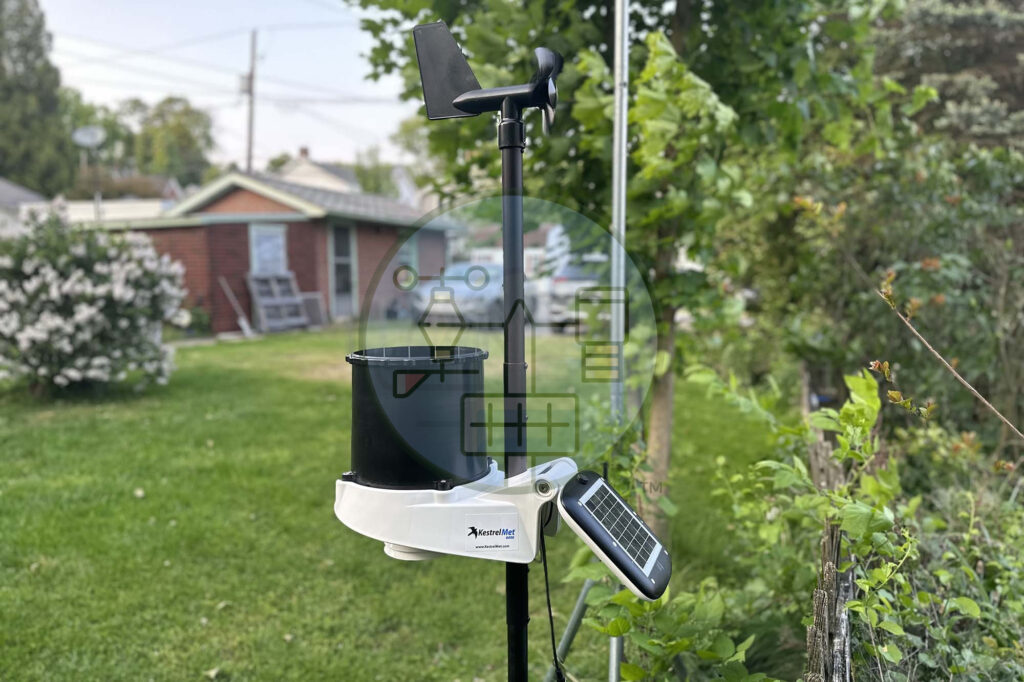
Kestrel, We’re Impressed
I was skeptical when I learned Kestrel wanted to produce a home weather station. While they’ve certainly made a name in handheld weather stations, a home weather station is an entirely different device. Kestrel did their homework. This station is on par with the Davis Vantage Pro2 and any prosumer weather station on the market.
The most important aspects of a modern consumer weather station are Internet connectivity, smart home connectivity, and expandability. While the price drags down the 6000’s score in our metrics, it is the only station to get a perfect score in every metric we use, including accuracy, durability, feature set, and ease of use.
We’re most excited about the expandability, which could take the 6000 to multiple places. We’re hoping for lightning detection and UV/solar, as those were the only things we felt were missing. But the rest of the station is so good that it hides its few shortcomings.
With all this said, this station is meant for the weather enthusiast. At $999, not many will have the funds for the 6000. In that case, we recommend the WeatherFlow Tempest instead, which remains our top pick (but just barely). But if you care about accuracy and want to pay less than the $1,000-2,000 that prosumer weather stations like the Vantage Pro2 cost, the KestrelMet 6000 is a great choice.


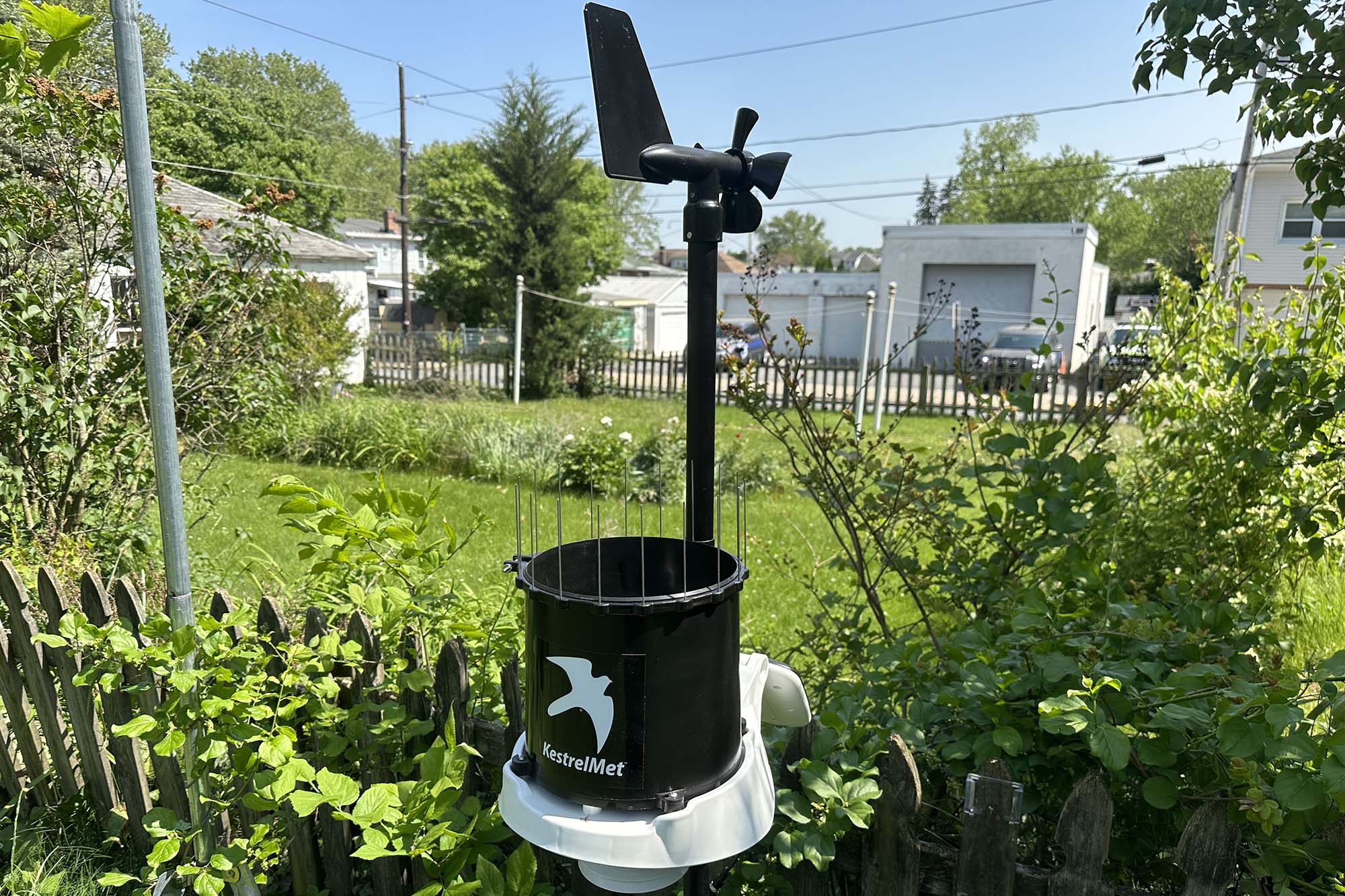




I have owned a Vantage Vue weather station, from Davis, plus another Davis weather station prior. Both have been huge disappointments. The newest one is probably eight or ten years old … not sure. I was never able to get it to work properly on my Mac and the people at Davis were curt and of no use in resolving that issue. The readings were wildly inaccurate. I am able to see the readings on the weather station but I wanted them on my computer.
What is the purpose of having a unit with cell connectivity over wifi?
Thanks
James Fulks